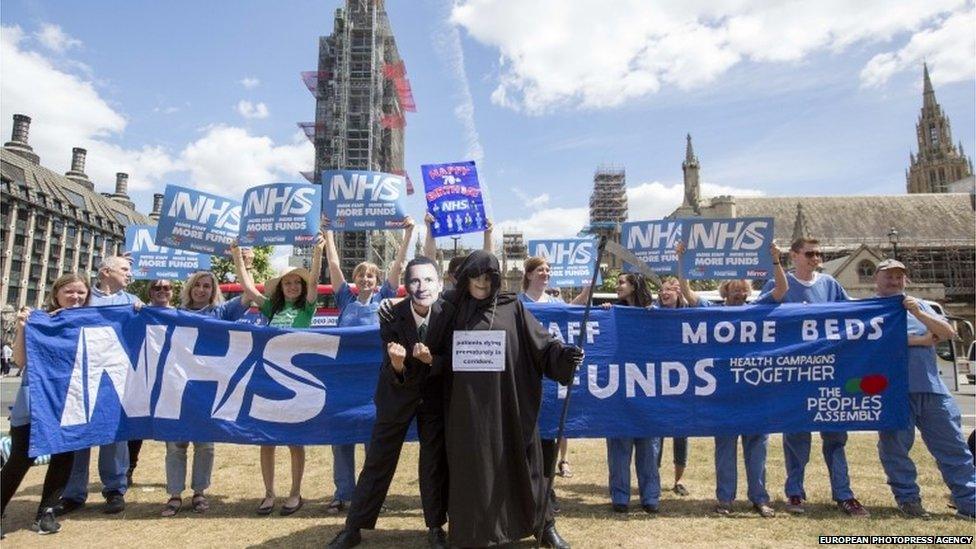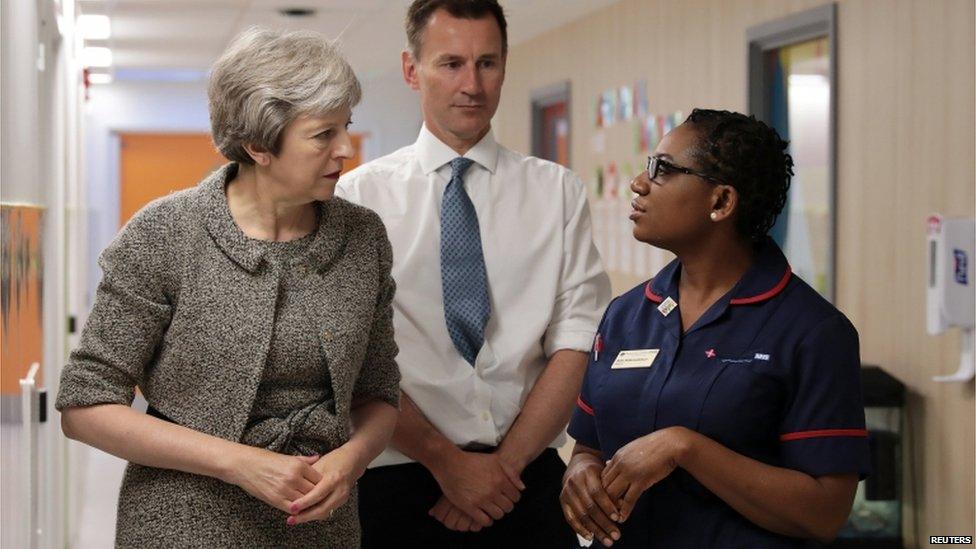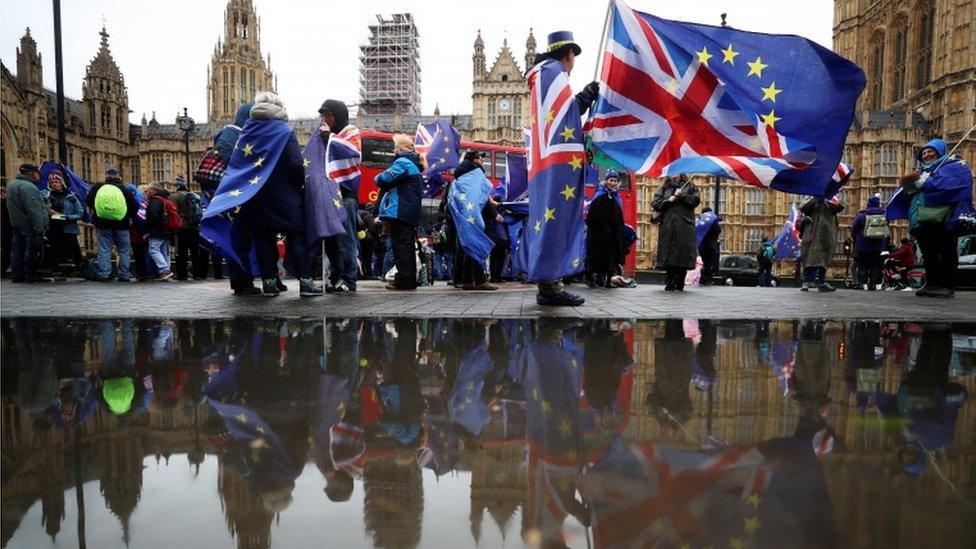Week ahead in Parliament
- Published
- comments

For once this week's Commons agenda is focused not on Brexit but on the detail of government spending.
Monday and Tuesday are taken up with Estimates day debates, external which will allow MPs the rare opportunity of probing ministers' spending plans - and with vast pressure on public spending, and the announcement that, having found £20bn for health and social care, the government had no money for anything else, these debates will offer a chance for MPs to highlight the funding problems across public services.
The debates were chosen by a competitive bidding process at the Backbench Business Committee, which, after a deft bit of internal footwork, now controls this block of debating time.
There are plenty of people in Westminster who doubt the government can hold the line against the demands for more spending - and these debates may provide a stiff test of ministerial and, in particular, Treasury resolve.
But Brexit is never far away, and with critical Cabinet discussions on Brexit policy due next weekend, keep an eye out for positioning and posturing from all quarters - Cabinet ministers (who have hardly been shy about airing their differences in public), Tory factions, Labour factions, and the smaller parties all have retaliation to get in first.
And speaking of retaliation, watch out for Labour causing a bit of procedural mischief in revenge for the government's refusal to "nod through" assorted sick and pregnant MPs during the crucial votes on the EU Withdrawal Bill. There are rumours they might force votes on normally unopposed business, to force the government to keep their MPs on hand.
Goodwill is in short supply at the moment, it seems.
And of course, don't forget that you can follow developments every night on Today in Parliament on BBC Radio 4, on BBC Parliament's daily roundup, and, of course, the via the Parliament Live page.
Here's my rundown of the week ahead:
Monday 2 July
The Commons opens (2.30pm) with Work and Pensions questions, doubtless to be followed by the usual post-weekend crop of ministerial statements and urgent questions. Not least is the probability of a report back from the prime minister on the latest EU heads of government summit - an important appetiser for next weekend's Cabinet discussions on Brexit.
Then comes the first of this week's four Estimates Day debates, on the estimates for the Ministry of Justice, where the main focus will be on the state of the prison system.

Then comes a debate on the social care budgets of the Department of Health and Social Care; and also Housing, Communities and Local Government - with select committee chairs Sarah Wollaston (Health) and Clive Betts (Housing and Local Government) pressing the case for a new funding system, as outlined in their latest joint report which warns that the system is already under "unsustainable strain,", external and will not be able to cope with the care needs of the rising number of elderly people.
The report calls for a new tax, a Social Care Premium modelled on National Insurance. This is probably the biggest example so far of increasingly ambitious select committees seeking to drive government policy.
In Westminster Hall (4.30 pm) MPs debate e-petition 212174, external - "Review the sentencing guidelines for theft offences, so that where the theft of a family pet is involved, monetary value is irrelevant for the categorisation of the crime for sentencing purposes."
It attracted 105,597 signatures, and the government has responded:
"We understand the distress caused by the theft of a much loved family pet and laws are in place to deal firmly with offenders who commit such crimes. Theft of a pet is already a criminal offence under the Theft Act 1968. The maximum penalty is 7 years' imprisonment. The Sentencing Council updated its guidelines in relation to sentencing for theft offences in February 2016. The guidelines take account of the emotional distress and therefore harm that theft of personal items such as a pet can have on the victim and accordingly recommends higher penalties for such offences. Compulsory microchipping introduced in 2016 makes it easier for lost or stolen dogs to be reunited with their owners."
There's an unusual event on the committee corridor, in the form of a second reading Committee (4.30pm) on the Voyeurism (Offences) (No. 2) Bill. This is a new incarnation of the bill to ban "upskirting" which was "objected" a fortnight ago, by the Conservative Sir Christopher Chope, and so denied a formal second reading, to the fury of its many backers.
That bill was proposed by the Lib Dem Wera Hobhouse, but this new version is a government bill, which helps protect it against further interference from awkward squad backbenchers. This unusual procedure, where the second reading debate, the debate on the basic principle of the bill, is taken in a committee (which I'm told will include Wera Hobhouse, although she is no longer the sponsor of the bill), rather than on the floor of the Commons, in the normal way. This is a route normally reserved for uncontroversial Law Commission Bills, which can be fast tracked to deal with technical problems in the law - it does require a formal Commons vote, later, but as government business, it stands a far better chance of being approved.
And alongside the Estimates Day debate on health and social care, MPs on the Health Committee take evidence from key NHS figures about NHS funding.
In the Lords (2.30 pm), two new peers will be introduced: Baroness Bryan of Partick, the Scottish writer and socialist campaigner who was nominated by Jeremy Corbyn. She is part of the Red Paper Collective, a group of Labour activists who aim to provide an alternative from the perspective of the Labour movement to the "sterile nationalist v unionist debate" around the Scottish independence referendums.
Then comes Baroness Barran, Diana Barran, the founder and chief executive of the domestic abuse awareness charity SafeLives. She will sit as a Conservative peer.
The main debates are on two committee reports; the first is on the ad-hoc Committee on the National Environment and Rural Communities Act 2006 report The Countryside at a Crossroads, external. This is followed by a debate on the EU Committee report UK-EU relations after Brexit.
Tuesday 3 July
The Commons opens (11.30am) with Treasury questions - with any urgent questions or ministerial statements following at 12.30pm.
The day's Ten Minute Rule bill, from the Scottish Conservative Ross Thomson, aims to change in the law on pet theft to make the punishment for harming an animal more severe. He argues that creating a serious criminal, punishable offence would recognise the status and importance that pets have within families.
Then comes another pair of Estimates Day debates, first on the Department for Education estimates. The Educations Committee Chair Robert Halfon will be arguing for a 10 year funding plan for schools and colleges, to match that for health and social care, and he is very concerned about the idea that the extra cash for the NHS might foreclose extra funding for other public services; then on the Treasury's grants to the devolved institutions - a chance to examine the sums paid to Scotland, Wales and Northern Ireland.
In Westminster Hall, debates include the implications for Scotland of leaving the EU (9.30am); UK-Israel trade (2.30pm) and uncontrolled shark fishing in the Atlantic (4pm). This last comes from the Scottish Conservative, Ross Thomson, who wants to highlight the global threat to shark populations around the world - he says up to 70 million sharks are killed every year, by both commercial and recreational fishing. Sharks, he argues, may not be "cute and the cuddly" but they still deserve equal attention and protection.

On the committee corridor, the Science and Technology Committee has the first of two hearings this week (9.30am) on the impact of social media and screen-use on young people's health with evidence from the Internet Watch Foundation, Barnardo's, the British Board of Film Classification and experts on children's mental and physical health.
They will look at young people's access to inappropriate content on social media with the focus on sexually explicit content, and the link between social media and health.
Secretary of State for International Development Penny Mordaunt and officials from the Charity Commission give evidence to the International Development Committee about sexual exploitation and abuse in the aid sector (2.30pm).
And a very recent former justice minister Phillip Lee is before the Digital, Culture, Media and Sport (10.30am) to talk about the social impact of participation in culture and sport. The word is that he had been pushing this issue within the Ministry of Justice, and had run into considerable institutional resistance - and the result could be an unusually frank account of Whitehall battling.
In the Lords (2.30pm) another new peer joins the House: Lord Haselhurst, the former deputy speaker of the Commons, Sir Alan Haselhurst.
Questions to ministers include one on increases in customer water bills and pay levels for water company executives, from Labour peer Baroness Jones of Whitchurch. Then there will be a brief third reading for the Refugees (Family Reunion) Bill from the Lib Dem, Baroness Hamwee, which aims to allow leave to enter or remain in the UK to be granted to the family members of refugees and to make legal aid to be made available for refugee family reunion cases.
There are two SI approval motions at the start of business: on official statistics and on social workers. These are followed by a debate on the ad-hoc Committee on Political Polling and Digital Media report The politics of polling, external. Last business is a debate on the EU Committee report Brexit: reciprocal healthcare, external.
Wednesday 4 July
The Commons opens (11.30am) with International Development questions, followed by Prime Minister's Questions, which now starts at noon and routinely runs for 45 minutes or so.
There's a Ten Minute Rule Bill from the International Development Committee chair, Stephen Twigg, on the protection of children and vulnerable adults in receipt of official development assistance and disaster relief. This comes out of the committee's work on the inquiry on sexual exploitation and the aid sector.

Ivory fans were among items seized during Operation Thunderstorm, an international operation against global wildlife crime
MPs will polish off the report and third reading stages of the Ivory Bill, which seeks to ban the sale of ivory. Labour have amendments down to include ivory from a hippopotamus, killer whale, narwhal, sperm whale, or walrus in the definition of ivory in the bill, and require a report to Parliament on the international ivory market, and how the Department for International Development is working to reduce global demand for ivory. This is a fairly uncontroversial bill, so the debate should be pretty rapid.
And then there is a half-day Opposition Day debate on an SNP motion, to be announced.
The adjournment debate led by the Labour MP Ann Clwyd, on the NHS complaints system in Wales, will bear watching. In 2012, she stunned MPs with a speech describing the "almost callous lack of care" with which nurses treated her husband as he lay dying in the University Hospital of Wales in Cardiff. She said her biggest regret was that she didn't "stand in the hospital corridor and scream" in protest, and she has continued to campaign on the issue.
In Westminster Hall the subjects for debate include speech, language and communication support for children (9.30am); management of NHS property (11am); incitement in the Palestinian education system (4pm) and five-year land supply (4.30pm).
My eye was particularly caught by the Labour MP Sarah Champion's debate on tackling demand for commercial sexual exploitation, which will highlight the findings of Behind Closed Doors: Organised sexual exploitation in England and Wales,, external the report of an inquiry by the All-Party Parliamentary Group on Prostitution and the Global Sex Trade. This points to the increasing role of organised crime in the sexual exploitation of women, and the rape, sexual abuse, physical violence, kidnapping, psychological abuse and coercive control involved.
The report recommends shifting the focus of the criminal law away from the women caught up in prostitution and onto the consumers, by introducing a blanket ban on paying for sex.
On the committee corridor, the Northern Ireland Secretary, Karen Bradley, gives evidence to MPs on NI Affairs Committee about the implementation of the Stormont House Agreement. And that Science and Technology Committee inquiry into the Impact of social media and screen-use on young people's health will hear (2.40pm) directly from young people, aged from 14-18, about how teenagers and children use social media and the way in which they view its risks and benefits.
In the Lords (3pm) peers debate the detail of the Rating (Property in Common Occupation) and Council Tax (Empty Dwellings) Bill at report stage, where the key issue is the variable cap on the empty property premium where a concession is expected.
They will also deal with uncontroversial Commons amendments on the Haulage Permits and Trailer Registration Bill and then comes the third reading of the Domestic Gas and Electricity (Tariff Cap) Bill where no votes are expected. The final business is a 90 minute mini-debate on the humanitarian crisis in South Sudan.
Thursday 5 July

When will the Trade and Customs bills return to the Commons?
The Commons opens (9.30am) with Transport questions - an increasingly fractious occasion, given the problems on the railways and the continuing skirmishing around Heathrow expansion. Then comes the weekly Business Statement from the Leader of the House, Andrea Leadsom, which will be keenly watched for dates for the return to the Commons of key Brexit legislation like the Trade Bill.
There is also some concern about the general debate that follows, on "the principle of proxy voting in the House of Commons".
Last week a number of sick and heavily pregnant MPs had to march through the voting lobbies after the "pairing" arrangements, which normally prevent this, were not applied - and there was considerable bad feeling. There are also some raised eyebrows about the very fact of this debate; back in February the Commons voted to instruct its Procedure Committee to come up with a proxy system for pregnant MPs - so why another more general debate now? All in all, this may not be quite the dry in-house debate the title suggests.
The remains of the day are taken up by a Backbench Business Committee debate on the future of the Transforming Social Care programme, external. It will be led by the Lib Dem, Norman Lamb, a health minister under the Coalition; and Labour MP Helen Hayes, on a motion expressing concern about the slow progress of the scheme to improve care for people with learning disabilities, and calling for it to be prioritised and properly resourced.
The adjournment debate, led by the Conservative former minister John Hayes, is on paupers' funerals. He says it is "extraordinary and appalling that some of the poorest bereaved Britons are banned, by some local authorities, from attending loved one's funerals and even forbidden from collecting their remains."
He will be calling on the government to order Councils to treat grieving relatives with dignity and decency.
In Westminster Hall (1.30pm) the DUP's Jim Shannon will lead a debate on the role of universal health coverage in tackling preventable and treatable diseases. And then the Labour MP, Rosie Duffield, leads a general debate on the 90th anniversary of the Equal Franchise Act 1928.
In the Lords, (11am) yet another new peer arrives. This time it's Lord Garnier, the former Conservative MP and solicitor-general Sir Edward Garnier.
The main debates are led by Labour peers. The first debate is from Baroness Bakewell on part-time and continuing education, and in particular the future of the Open University.
The second, led by Lord Darzi, is on the creation of the NHS in 1948 and the case for achieving the integration of health, mental health, social and community care to equip the NHS for the next 70 years.
The one-hour short debate in between, is on social care funding in England. And finally there is a debate on improving communications for use in the event of a terrorist incident or other major emergency - led by Lord Harris of Haringey, the former chair of the Metropolitan Police Authority
Friday 6 July
It is private members' bill day in the Commons (9.30am). First up is the Mental Health Units (Use of Force) Bill, external - the bill, proposed by Labour's Steve Reed, ran out of time on its previous Friday sitting, but now it's reached third reading it takes priority over other business, so it should get through. But after the events of the last Friday sitting, where a couple of maverick Conservatives prevented it from reaching a vote, Mr Reed and some of the big mental health campaigning organisations have launched a whipping operation to ensure there is no repeat, and will seek to have the hundred MPs needed to force it to a vote present and ready to break any attempted filibuster.
The next two bills are also favoured by the government - Maria Caulfield's Prisons (Interference with Wireless Telegraphy) Bill, external and Peter Bone's Health and Social Care (National Data Guardian) Bill, external.
Both are due to go through their report and third reading stages of debate.
Then comes the second reading debate on the National Living Wage (Extension to Young People) Bill, external - proposed by the Labour MP, Holly Lynch. She might just get a few minutes to make some arguments in favour - but barring some unexpected manoeuvre, it looks unlikely this bill will be put to a vote.
Further down the agenda are any number of bills presented by the Conservative Sir Christopher Chope - which probably will not be debated. But some other members may take some pleasure in "objecting" when their titles are read out at the close of the main business at 2.30pm.
Finally, keep an eye on the adjournment debate from Labour's Thangam Debbonaire - she's looking at the issue of drug testing, not of people, but of the drugs themselves. A number of organisations now offer free testing of illegal drugs to ensure that they don't contain ingredients that could kill their users.